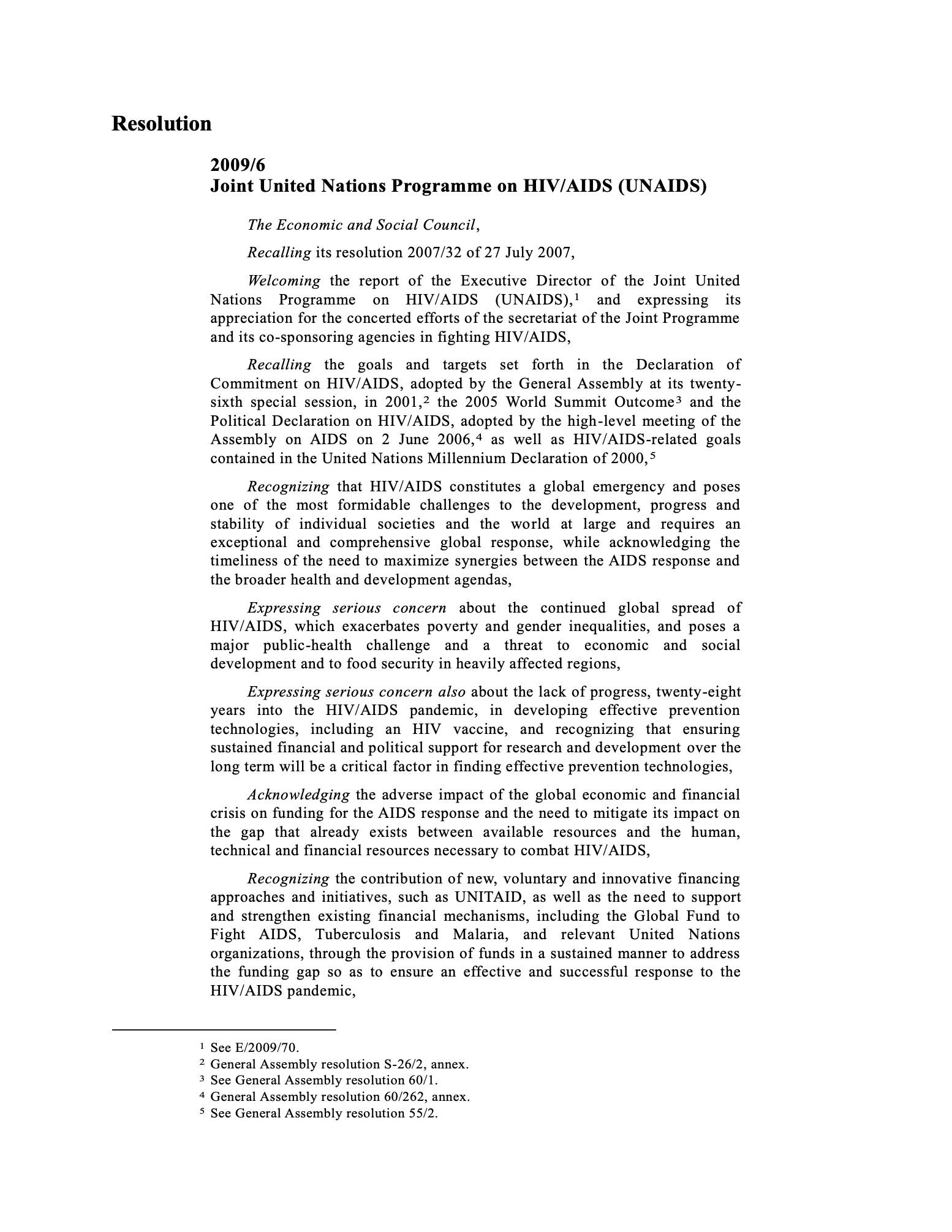2009 ECOSOC Resolution on UNAIDS
Analysis of precedential value
Resolution passed at the 36th plenary meeting of the United Nations Economic and Social Council (UNESC)–the UN’s central forum for advancing sustainable development’s economic, social and environmental dimensions. It comprises 54 Member States elected regularly by the UN General Assembly. In draft form, this text was sponsored by 30 Member States.
Used as precedent
stigma and discrimination
“Acknowledges the insidious and persistent drivers of the epidemic, in particular stigma, discrimination, gender inequality, socio-economic inequality and lack of respect for human rights, also acknowledges that in some cases food insecurity and displacements, for example, can lead to increased vulnerability, and encourages intensified analysis and advocacy by the Joint Programme to ensure that underlying obstacles to universal access are understood and appropriately addressed at all levels and in all settings, including through services to underserved and vulnerable populations.” (paragraph 4)
access to health products
“Reaffirms the right to use, to the full, the provisions contained in the Agreement on Trade-related Aspects of Intellectual Property Rights, the Doha Declaration on the Agreement on Trade-related Aspects of Intellectual Property Rights and Public Health, and the decision of the World Trade Organization General Council of 30 August 2003 on the implementation of paragraph 6 of the Doha Declaration on the TRIPS Agreement and public health, and, when formal acceptance procedures are completed, the amendment to article 31 of the Agreement, which provide flexibilities for the protection of public health, and, in particular, to promote access to medicines for all, and also calls for a broad and timely acceptance of the amendment to article 31 of the Agreement on Trade-related Aspects of Intellectual Property Rights, as proposed by the World Trade Organization General Council in its decision of 6 December 2005.” (paragraph 9)
“Urges Governments to prioritize and expand access to the prevention and treatment of HIV-related opportunistic infections, to promote access to and the effective use of safe and effective antiretroviral drugs of assured quality, at affordable prices, and to support both biomedical and socio-economic research on new products to prevent HIV infection, including those controlled by women, diagnostics, medicines and other treatment commodities and technologies related to HIV.” (paragraph 11)
key population and community leadership
“Acknowledges the critical importance of people living with HIV to all aspects of national AIDS responses, global advocacy efforts and the work of the United Nations system on AIDS, and encourages increased support for the capacity of civil society to carry out programme implementation and advocacy, directed towards the goal of ensuring universal access to prevention, treatment, care and support.” (paragraph 16)
positive legal determinants
“Recognizes the need for the Joint Programme to significantly expand and strengthen its work with national Governments and to work with all groups of civil society to address the gap in access to services for injecting drug users in all settings, including prisons, to develop comprehensive models of appropriate service delivery for injecting drug users, to tackle the issues of stigmatization and discrimination, and to support increased capacity and resources for the provision of a comprehensive package of services for injecting drug users, including harm reduction programmes in relation to HIV, as elaborated in the WHO, UNODC, UNAIDS Technical Guide for Countries to Set Targets for Universal Access to HIV Prevention, Treatment and Care for Injecting Drug Users, in accordance with relevant national circumstances.” (paragraph 19)
sexual orientation
“Welcomes the promulgation of the UNAIDS Action Framework: Universal Access for Men Who Have Sex with Men and Transgender People, and the follow-up action that is already under way, and calls on the Joint Programme and other partners to support further action and strengthen partnerships to address the political, social, legal and economic barriers to universal access, as part of the agreed Unified Budget and Workplan priorities.” (paragraph 20)
gender equality
“Recognizes the interrelated nature of the health- and gender-related Millennium Development Goals, and welcomes the progress made by the Joint Programme in assisting countries in accelerating action on women, girls and gender equality within the context of AIDS, including the appointment of an advisory group, under the leadership of the Executive Director, to develop, implement and monitor an operational plan in relation to a strengthened inter-agency strategy and the drafting of the UNAIDS Action Framework: Addressing Women, Girls, Gender Equality and HIV.” (paragraph 21)
